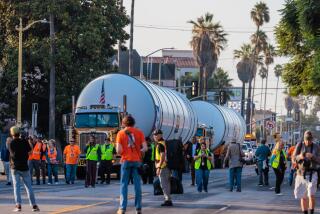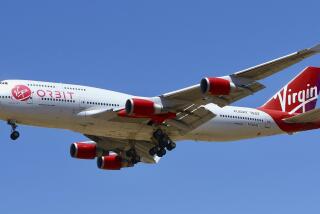McDonnell Douglas 1 of 4 Finalists on Rocket Project : Aerospace: O.C. division will get funds to develop workable system for new satellite launchers.
- Share via
WASHINGTON — McDonnell Douglas Corp.’s aerospace group in Huntington Beach was one of four companies chosen Thursday by the Air Force to develop a new generation of low-cost rockets for launching military and commercial space satellites.
The other participants are Boeing Co.’s Defense and Space Group in Seattle, Lockheed Martin Corp.’s Astronautics division in Denver and Alliant Techsystems’ rocket group in Magna, Utah.
The new system, still in the early stages of development, is intended to replace existing U.S.-built boosters that were designed in the early 1950s to carry intercontinental ballistic missiles.
Those existing boosters include the Titan and Atlas families of rockets made by Lockheed Martin and the smaller Delta rockets built by McDonnell Douglas.
The selection Thursday does not guarantee that McDonnell Douglas will ultimately be awarded a contract to build a new family of rockets. Two of the four manufacturers will be eliminated from the competition in 1997, and the final production contract will be awarded to a single company in mid-1998.
It is also an open question whether Congress will continue to provide the funding in coming years to put a new rocket into production.
For now, both Air Force and industry officials indicated that the project is likely to have little effect on the employment picture for the heavily depressed defense industry, either in California or other parts of the country.
Sheila E. Widnall, secretary of the Air Force, told reporters that the primary aim of the new program is to produce a lower-cost rocket that would make launching satellites less expensive.
“We do not view this as an industrial-base program or a job program,” she said.
McDonnell Douglas also expects no effect on its Huntington Beach employment, a spokeswoman said.
Thursday’s decision will give McDonnell Douglas and each of the other contractors $30 million so they can design a workable rocket system--the first phase in a lengthy procedure aimed at beginning production in the year 2000.
A second stage of the program, intended to narrow the competition to two contractors, is expected to involve about $130 million in seed money for the finalists. The entire program, including the development grants for Phases I and II, could reach $2 billion.
Widnall predicted that the new generation of rockets, known as evolved expendable launch vehicles, or EELVs, will cost 25% to 50% less than the Titan, Delta and Atlas boosters, making satellite launches far less expensive both for the military and commercial firms.
That would help make the United States more competitive in the worldwide rocket-launching business, which also includes such major players as Arianespace of Europe.
Widnall said the savings will stem from lower manufacturing costs and the fact that the rockets will require fewer people to operate. “Our nation needs this program for economic and commercial reasons as well as for national defense,” she said.
The EELV is one of two U.S. efforts to boost the nation’s presence in future launch programs. Major space contractors, under a National Aeronautics and Space Administration program, are pursuing development of reusable launch vehicles--currently dubbed X-33 and X-34--that would replace the space shuttle fleet.
More to Read
Inside the business of entertainment
The Wide Shot brings you news, analysis and insights on everything from streaming wars to production — and what it all means for the future.
You may occasionally receive promotional content from the Los Angeles Times.










